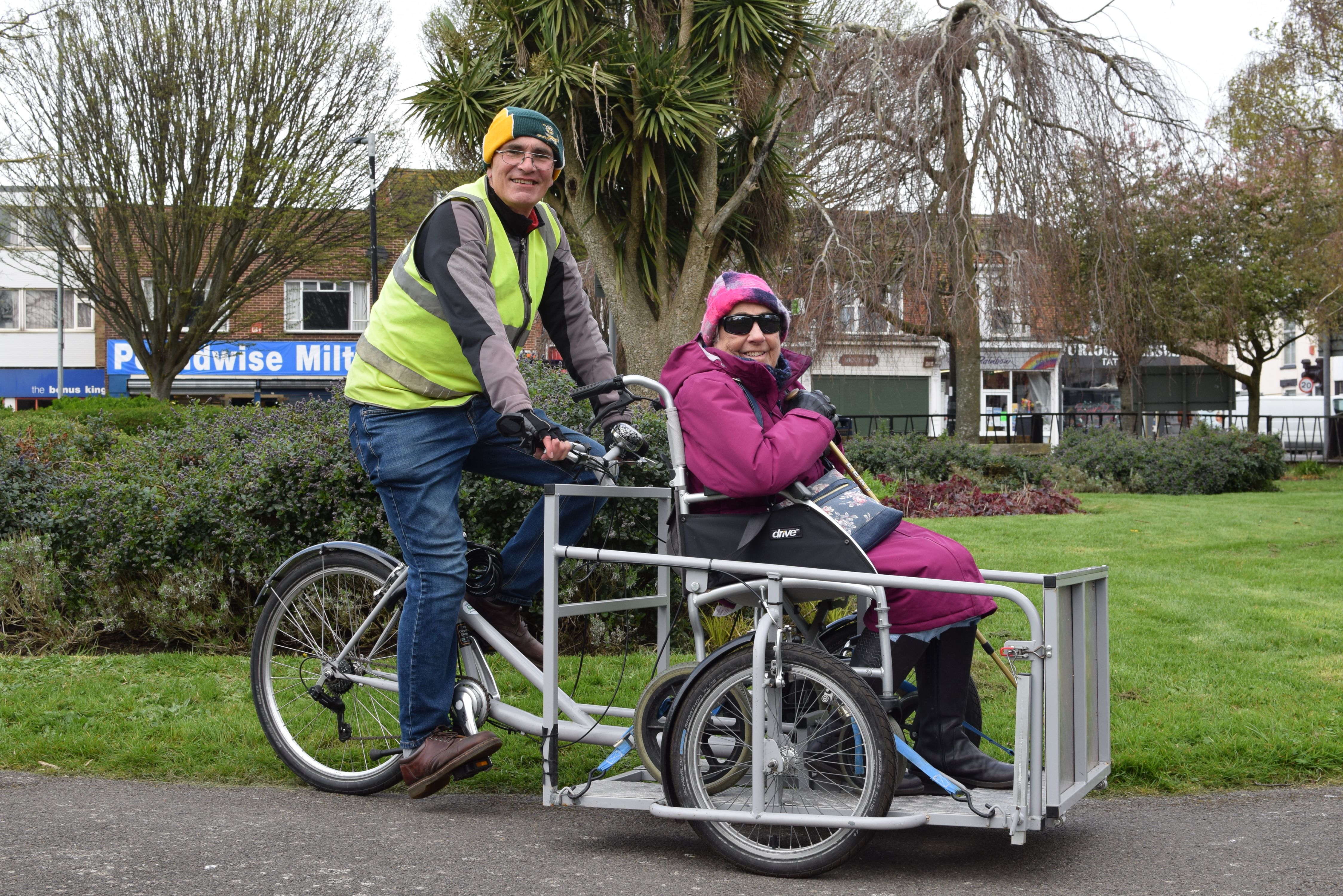Roger and Stella, a son and mother duo, navigate Portsmouth using an adapted cargo tricycle. This cargo bike is integral to their daily routine, enabling them to travel, stay healthy, and maintain connections within their community.
How do you use your bike around Portsmouth?
In 2018, my parents relocated to Portsmouth, where they used to engage in cycling activities with Pompey Pedals, a local organization offering adapted cycles for exercise. However, when the pandemic hit, attending sessions became impossible. It was then that we acquired an adapted cargo tricycle capable of accommodating a passenger in a wheelchair at the front.
Initially, I used the tricycle with my father, who had suffered several strokes and was a wheelchair user unable to walk. Previous attempts with a mobility scooter failed as he would often fall asleep, posing safety concerns. Similarly, car rides would result in him falling asleep and being drowsy upon arrival. However, the tricycle changed everything.
Taking my father around Portsmouth, he remained alert and began recounting stories from his childhood during wartime. He pointed out areas destroyed by bombs and reminisced about how life growing up in wartime Portsmouth was. Witnessing this transformation was remarkable, especially considering the cognitive effects of his strokes, akin to dementia. Moreover, being outdoors on the tricycle allowed him to maintain social connections during the pandemic, replacing the clubs he used to attend. He would wave to passers-by and engage in distanced conversations, fostering a sense of community.
Riding around Portsmouth with my father was invaluable, strengthening our bond and connecting us with those around us. Even in his final days, he cherished these rides. Following his passing, my mother’s mobility declined due to arthritis, prompting us to use the tricycle for various outings across Portsmouth. We visit cafes, shops, enjoy leisure rides, and run errands together. Accessing the local GP surgery and St Mary’s Hospital is now stress-free compared to the challenges faced when using a car, such as traffic congestion and parking difficulties. With the tricycle, we arrive at our destination refreshed and can park conveniently, making our journeys smoother and more enjoyable.
What do you like about travelling by bike?
We’ve seen firsthand how cycling positively impacts both our physical and mental well-being. My mom has dementia, and my dad experienced similar symptoms after his strokes. What surprised me was how beneficial biking is for dementia—it seems to slow it down.
At first, I thought maybe it was just because my parents were adventurers—they travelled the world and had all sorts of experiences. But then, as a volunteer for Cycling Without Age, I noticed the same calming effect on residents of care homes who use specially adapted trishaws. After a ride, they’re much calmer and easier to care for days afterward.
Stella adds: I like being on the bike, because it feels as if I was actually cycling myself. I actually feel normal and not someone who has a disability. I like the reactions of children when they look at the bike fascinated. And that makes me feel good. People wave at you, I now need to learn to how to wave back like a Queen.
Tell us a bit more about your bike?
The bike is manufactured in the UK by the Cargo Bike Company based in Derbyshire. Its versatile frame can be customized for various purposes—we have a ramp and platform, but it can also be configured as a cargo box or anything else you might need, whether for personal or business use.
What isn’t so great about cycling in the city?
The bike’s low profile aids balance, but we often encounter challenges with narrow dropped kerbs, which can leave us stuck. Wider, more inclusive dropped kerbs designed for all users would greatly improve accessibility.
Most drivers have reacted positively to our presence on the road. Once, a driver unexpectedly pulled in front of us during our ride, initially raising concerns that we had upset them. However, their fascination with the bike turned the encounter into a positive one. They were looking to buy a similar bike for their brother who had suffered a stroke, shifting our initial apprehension into a pleasant surprise.
Talking to other cargo bike riders, we’ve noticed that drivers tend to give more space to cargo bikes, perceiving them as larger vehicles. Additionally, having a passenger at the front seems to prompt drivers to give us even more room compared to when riding a standard bike. This makes us feel much safer on the road.
What else would you like to add?
If you do not feel confident cycling, consider taking training such as Bikeability training. You can contact PCC or Cycling UK for assistance. Start by cycling during quieter hours, like between 10AM and 2PM, to gradually build confidence. Take small steps by doing short journeys to the shops or work. For work commutes, try a practice run on a Saturday to track timing and find a quieter route.
Also, as a former HGV driver, I know how frustrating driving in a city can be and believe cargo bike logistics could work well in Portsmouth for last-mile deliveries.
From the PCF Team
We thank Roger and Stella for sharing their inspiring story. Their experience highlights the myriad benefits of cycling, showcasing its power to keep individuals healthy and connected throughout life. Cargo bikes, in particular, have the potential to transform lives, offering numerous opportunities for both personal and business use.
Roger is also a volunteer for cycling organisations Pompey Pedals, which gives people the opportunity to cycle on a regular basis through help, support and guidance and Cycling Without Age, an initiative where volunteers take older people and those with mobility difficulties out on ‘trishaw’ cycle rides. Would you like to share your story about ordinary people doing ordinary things on their bikes in the city? We’d love to hear from you.
Get in touch at info@pompeybug.co.uk

